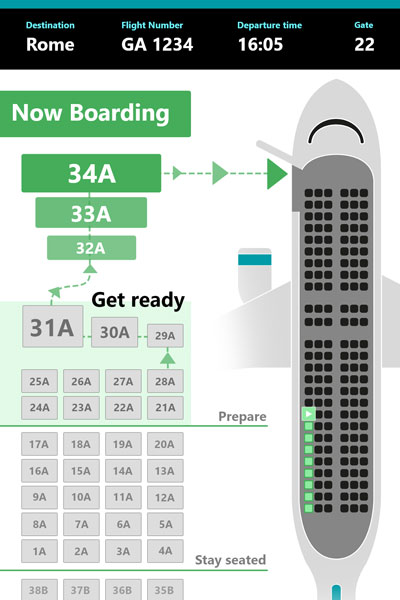
London Gatwick is trialling a new boarding technique in partnership with easyJet in a bid to avoid queues and congestion at gates.
During the two-month trial, digital screens and staff will be placed at Gatwick Airport’s Gate 101 to show passengers the order to board. A range of sequences will be trialled to test whether they make the process faster, more relaxing and, potentially, reduce the need for large numbers of passengers to rush forward at any stage.
Possible sequences include seating people from the back row to the front with window seats first, middle seats next, and aisle seats last.
Passengers who have booked priority boarding – or those who require special assistance or are travelling with young families – will still board first during the trial.
Modelling indicates that these techniques may be able to reduce boarding times by up to 10%, compared to conventional methods. Learnings from the trial, as well as feedback from passengers, will be used to decide whether to take this concept forward or not.
Abhi Chacko, Head of Enabling Technologies and Digital Innovation, Gatwick Airport said: “We want to explore whether boarding by seat number will avoid queues in the gate room and when boarding the aircraft.
“Early indications are that this new technique has the potential to reduce the overall boarding time. By communicating to passengers better and boarding passengers by seat number, we also expect to make the whole boarding experience more relaxing and, potentially, prevent large numbers of passenger rushing forward at any stage.”
It will be interesting to see the results this trial will bring and the effect it could have on other aspects of the passenger experience. For instance, according to easyJet’s website the airline’s cabin space is limited with a capacity for up to 70 cabin bags, so the overhead lockers fill up quickly.
In theory, passengers who have window seats will not only be among the first to board the plane, but they will also have the priority to use the overhead lockers, as opposed to a first come, first served approach. If the flight is fully booked, all remaining cabin bags will have to be put into the hold.
So the question remains as to whether this trial will be warmly received by all passengers, and whether it could be used by airlines as another opportunity to boost ancillary revenues by offering a “premium” option to passengers who prefer the window seat. FTE will certainly be keeping a close eye on the key findings.






